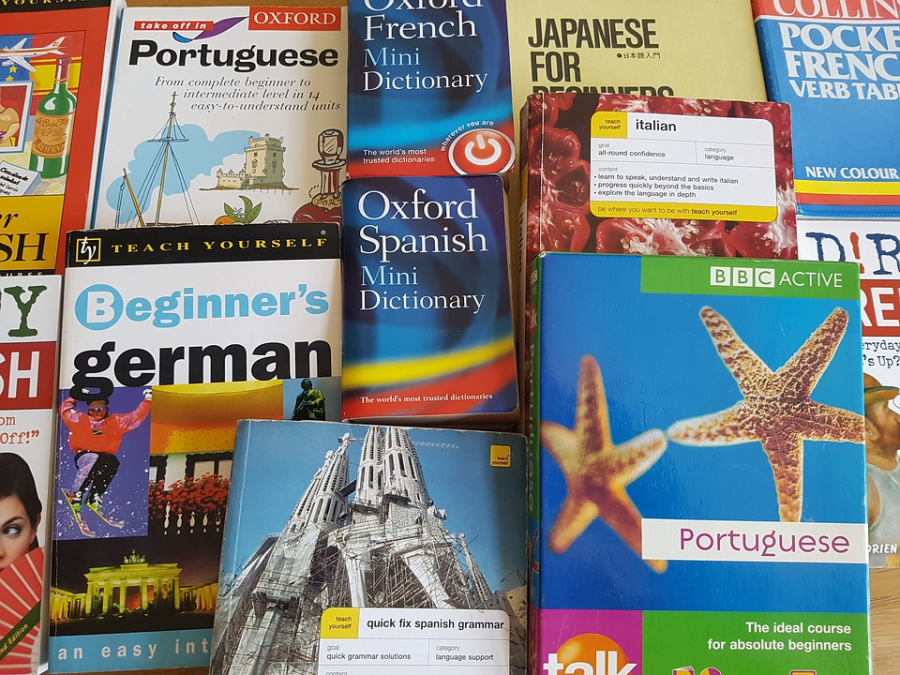National Foreign Language Week
Photo by Creative Commons
It’s Foreign Language Week!
It is estimated that between 50 to 65 percent of people in the world are bilingual. That’s more than the percent of people in the world who are left-handed, which stands at a mere 12 percent! In the United States alone, according to the Census Bureau, one in five U.S. residents speak a foreign language at home. While foreign languages can and should be celebrated any day of the year, March 4th-10th is National Foreign Language Week. President Dwight D. Eisenhower first endorsed the celebration through a telegram in 1956, and it has been nationally recognized by every succeeding president since.To celebrate National Foreign Language Week, The Red & Black presents the many advantages of learning a foreign language.
The ten most spoken languages in the world are Chinese, Spanish, English, Hindi, Arabic, Portuguese, Bengali, Russian, Japanese, and Punjabi/Lahnda, respectively. Surprisingly, more than half of world languages have no written form, only spoken form. Spanish, Chinese, and Tagalog are the most spoken foreign languages in the US. In fact, the US has more Spanish speakers than Spain!
Señora Adriana Devers-Rodriguez, una maestra del español a Patchogue-Medford, dijo que, “Yo pienso que el aprender otro idioma nos ofrece una visión más abierta de la sociedad y de nosotros mismos, nos permite crecer y entender con menos prejuicio y más solidaridad.” Cuando una persona aprenda un idioma, la persona entiende la vida de una otra persona. Como seres humanos somos muy enfocados con nosotros mismos y nuestras vidas. Cuando nosotros aprendemos una lengua, nosotros eliminamos la idea de ignorancia y abrimos un mundo completamente nueva. Señora Devers-Rodriguez está teniendo una presentación especial el 23 de marzo en el salón 216 dónde ella hablará de la importancia de aprender lenguas.
“One of my favorite quotes regarding language is [by Nelson Mandela]: ‘if you talk to a man in a language he understands, that goes to his head. If you talk to him in his own language, it goes to his heart,’” Mrs. Ana Leal, a former Spanish teacher and current dean at Patchogue-Medford, shared, “Along with learning the language, we must learn the culture [as] they go hand in hand. We must make every effort to understand culture; it opens our eyes to the world and we become more empathetic of their stories, struggles, etc. Language without cultural understanding is a very superficial way in trying to connect with the world.” Without learning the culture, we cannot fully appreciate another language. Culture and language go hand in hand.
Aprender otro idioma tiene muchos beneficios:
- Knowing another language enhances a person’s multitasking skills. According to a 2011 Pennsylvania State University research study, “bilingual speakers can outperform monolinguals in certain mental abilities, such as editing out irrelevant information and focusing on important information.” This is due to the fact that bilinguals are able to juggle and negotiate between languages without difficulty.
- Aprender otro idioma puede ofrecerle muchas oportunidades de trabajo. En los Estados Unidos en 2010, había más que 630,000 ofertas de empleo que buscaban para bilingües. Porque nosotros vivimos en un mundo dónde comunicación es muy importante, el número de empleos que requieren bilingüismo aumentará seguramente en los próximos años.
- Speaking another language adds another dimension to who you are. According to 2008 University of Chicago research study, bilinguals have slightly different personalities depending on the language they are speaking. For example, the women studied in this analysis defined themselves as more assertive and extroverted when they spoke Spanish than when they spoke English. These shifts happen subconsciously, and suggests that when we learn a new language, we learn a new piece of who we are as characters.
- Saber otra lengua mejora su idioma dominante. Por ejemplo, saber español puede ayudar a su inglés en un nivel gramatical. Cuándo nosotros sabemos cómo formar una oración en español, estas habilidades se traducen en nuestros conocimientos de inglés. Esto nos hace mejores comunicadores, escritores, y editores.
- Bilinguals have better listening skills – both literally and figuratively. While it’s been supported that bilinguals are better communicators and listeners within language, it’s been discovered that bilinguals also have a heightened ability to process sound. Such abilities include being able to recognize sounds, having better musical pitch, and carrying a conversation while distracting noises or songs are present in the background.
- Bilingüismo previene la demencia y alzhéimer. Según un estudio conducido por la universidad de Edinburgh en 2013, el inicio de la demencia retrasó por cuatro año para los bilingües que cuando se compara a los monolingües.
- Learning a new language can cause the brain to grow. According to a study conducted by researcher Johan Martensson, study participant’s brains grew in four places: the hippocampus, middle frontal gyrus, inferior frontal gyrus, and superior temporal gyrus, after studying a language for three months. As you learn a new language, the part of the brain responsible for language becomes larger. The more languages you learn, the more adaptive and flexible your brain becomes.
- Saber varios idiomas provee una imagen y perspectiva nueva del mundo alrededor de nosotros. Como Sra. Devers-Rodriguez que dijo, una persona quien sabe varios idiomas es más probable a apreciar y entender otras culturas diferencias. Aún más, los bilingües tienen una mayor sensibilidad a lo que las personas sienten. Esto les da una mejor capacidad para comunicarse y simpatizar con otros alrededor de ellos, independientemente de las diferencias.
- You’re able to experience a culture’s history, cinema, literature, music, and so much more from an insider’s point of view. No longer will you be looking at an Italian Renaissance painting from an outsider’s point of view once you study Italian! Being able to experience and understand a culture gives you a new appreciation for it.
Las ventajas de aprender otro idioma pueden mejorar la vida de una persona en muchos sentidos. Entre mejorar su memoria y ofrecerle nuevas oportunidades de trabajo, no hay razón para no aprender un segundo o tercer idioma. Tome esta oportunidad para apreciar los muchos idiomas alrededor de usted y tal vez aprenda una lengua nueva. Después de todo, nunca he sabido de una desventaja a aprender un idioma segundo.

Adelphi Quill Award Winner - 3rd Place, Most Outstanding Reporter (2018)
Grade 12
"You can never be overdressed or overeducated." - Oscar Wilde







Ms. Vogel • Mar 14, 2018 at 11:50 am
Fantástico!
Fantastique!
Fantastico!
Fantastic!
Ms. Ribeiro • Mar 13, 2018 at 8:33 pm
Nice job! Buen trabajo!